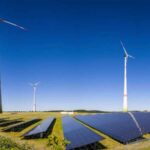Nuclear energy cannot meaningfully contribute to a climate-neutral energy system say German scientists
By Ben Wealer et al., Scientists for Future
In light of the accelerating climate crisis, nuclear energy and its place in the future energy mix is being debated once again. Currently its share of global electricity generation is about 10 percent. Some countries, international organizations, private businesses and scientists accord nuclear energy some kind of role in the pursuit of climate neutrality and in ending the era of fossil fuels. The IPCC, too, includes nuclear energy in its scenarios.
On the other hand, the experience with commercial nuclear energy generation acquired over the past seven decades points to the significant technical, economic, and social risks involved. This paper reviews arguments in the areas of “technology and risks,” “economic viability,” ’timely availability,” and “compatibility with social-ecological transformation processes.”
Technology and risks: Catastrophes involving the release of radioactive material are always a real possibility, as illustrated by the major accidents in Three Mile Island, Chernobyl, and Fukushima. Also, since 1945, countless accidents have occurred wherever nuclear energy has been deployed. No significantly higher reliability is to be expected from the SMRs (“small modular reactors”) that are currently at the planning stage. Even modern mathematical techniques, such as probabilistic security analyses (PSAs), do not adequately reflect important factors, such as deficient security arrangements or rare natural disasters and thereby systematically underestimate the risks.

Moreover, there is the ever-present proliferation risk of weapon-grade, highly enriched uranium, and plutonium. Most spent fuel rods are stored in scarcely protected surface containers or other interim solutions, often outside proper containment structures. The safe storage of highly radioactive material, owing to a half-life of individual isotopes of over a million years, must be guaranteed for eons. Even if the risks involved for future generations cannot be authoritatively determined today, heavy burdens are undoubtedly externalized to the future.
Nuclear energy and economic efficiency: The commercial use of nuclear energy was, in the 1950s, the by-product of military programmes. Not then, and not since, has nuclear energy been a competitive energy source. Even the continued use of existing plants is not economical, while investments into third generation reactors are projected to require subsidies to the tune of billions of $ or €. The experience with the development of SMR concepts suggests that these are prone to lead to even higher electricity costs.

Lastly, there are the considerable, currently largely unknown costs involved in dismantling nuclear power plants and in the safe storage of radioactive waste. Detailed analyses confirm that meeting ambitious climate goals (i.?e. global heating of between 1.5° and below 2° Celsius) is well possible with renewables which, if system costs are considered, are also considerably cheaper than nuclear energy. Given, too, that nuclear power plants are not commercially insurable, the risks inherent in their operation must be borne by society at large. The currently hyped SMRs and the so-called Generation IV concepts (not light-water cooled) are technologically immature and far from commercially viable.
Timely availability: Given the stagnating or – with the exception of China – slowing pace of nuclear power plant construction, and considering furthermore the limited innovation potential as well as the timeframe of two decades for planning and construction, nuclear power is not a viable tool to mitigate global heating. Since 1976, the number of nuclear power plants construction starts is declining. Currently, only 52 nuclear power plants are being built. Very few countries are pursuing respective plans. Traditional nuclear producers, such as Westinghouse (USA) and Framatome (France) are in dire straits financially and are not able to launch a significant number of new construction projects in the coming decade. It can be doubted whether Russia or China have the capacity to meet a hypothetically surging demand for nuclear energy but, in any event, relying on them would be neither safe nor geopolitically desirable.
Nuclear energy in the social-ecological transformation: The ultimate challenge of the great transformation, i.?e. kicking off the socio-ecological reforms that will lead to a broadly supported, viable, climate-neutral energy system, lies in overcoming the drag (“lock-in”) of the old system that is dominated by fossil fuel interests. Yet, make no mistake, nuclear energy is of no use to support this process. In fact, it blocks it. The massive R&D investment required for a dead-end technology crowds out the development of sustainable technologies, such as those in the areas of renewables, energy storage and efficiency.
Nuclear energy producers, given the competitive environment they operate in, are incentivized to prevent – or minimize – investments in renewables. For obvious technical as well as economic reasons, nuclear hydrogen – the often-proclaimed deus ex machina – cannot enhance the viability of nuclear power plants. Japan is an exhibit A of transformation resistance. In Germany the end of the atomic era proceeds, and the last six nuclear power stations will be switched off in 2021 and 2022, but further steps are still needed, most importantly the search for a safe storage facility for radioactive waste.
By way of conclusion: The present analysis reviews a whole range of arguments based on the most recent and authoritative scientific literature. It confirms the assessment of the paper Climate-friendly energy supply for Germany – 16 points of orientation, published on 22 April 2021 by Scientists for Future (doi.org/10.5281/zenodo.4409334) that nuclear energy cannot, in the short time remaining before the climate tips, meaningfully contribute to a climate-neutral energy system. Nuclear energy is too dangerous, too expensive, and too sluggishly deployable to play a significant role in mitigating the climate crisis. In addition, nuclear energy is an obstacle to achieving the social-ecological transformation, without which ambitious climate goals are elusive.
This article is the English language summary of the findings of the German report by Scientists for Future (S4F) International. S4F supports the global climate movement by providing facts and materials based on reliable and accepted scientific data to activists, politicians, decision makers, educators and the general public.
This article first appeared on Zenodo which is an open access Creative Commons Attribution Share Alike 4.0 International site. For further reading, see also the similar conclusions of this article in DW.
Headline photo: Opposition to nuclear energy in Germany has been strong and the country will close its last six nuclear power stations in 2021 and 2022. (Photo: Jacob Hüber/Wikimedia Commons)
Source: https://beyondnuclearinternational.org/2021/12/12/nuclear-cant-deliver-on-climate/


